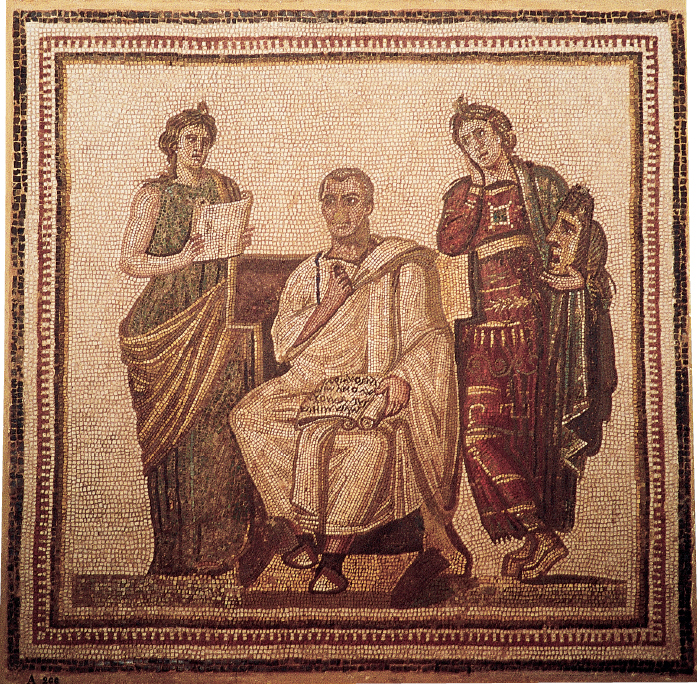The Flowering of Latin Literature
Many poets and prose writers were active in the late republic and the principate, and the period from about 50 B.C.E. to 20 C.E. is known as the golden age of Latin literature. Roman poets and prose writers produced works that were highly polished, elegant in style, and intellectual in conception. Roman poets referred to the gods often and treated mythological themes, but the core subject matter of their work was human, not divine.

Virgil and the AeneidThis third-century mosaic from the prosperous Roman city of Hardrumentum in North Africa shows Virgil holding a copy of his great epic poem and flanked by two Muses. The Muses, nine in all, were minor Greek and Roman goddesses who were thought to inspire artists and writers. The female Muses’ role as inspiration, not authors, accurately reflects surviving Latin literature of the Augustan period, all of which, except for a few fragments, is by male authors. (C. M. Dixon/Ancient Art & Architecture Collection)
Rome’s greatest poet was Virgil (70–19 B.C.E.), who drew on earlier traditions, but gave them new twists. His masterpiece is the Aeneid (uh-NEE-ihd), an epic poem that is the Latin equivalent of the Greek Iliad and Odyssey (see "Homer, Hesiod, and the Epic" in Chapter 3). Virgil’s account of the founding of Rome and the early years of the city gave final form to the legend of Aeneas, the Trojan hero (and ancestor of Romulus and Remus) who escaped to Italy at the fall of Troy. As Virgil told it, Aeneas became the lover of Dido, the widowed queen of Carthage, but left her because his destiny called him to found Rome. In leaving Dido, an “Eastern” queen, Aeneas put duty and the good of the state ahead of marriage or pleasure. The parallels between this story and the very recent real events involving Antony and Cleopatra were not lost on Virgil’s audience. Making the public aware of these parallels and of Virgil’s description of Aeneas as an ancestor of Julius Caesar fit well with Augustus’s aims. Therefore, Augustus encouraged Virgil to write the Aeneid and made sure it was circulated widely immediately after Virgil died.
The poet Horace (65–8 B.C.E.) rose from humble beginnings to friendship with Augustus. His most important works are a series of odes, short lyric poems often focusing on a single individual or event. One of these commemorated Augustus’s victory over Antony and Cleopatra at Actium in 31 B.C.E. Horace depicted Cleopatra as a frenzied queen, drunk with desire to destroy Rome, a view that has influenced opinions about Cleopatra to this day.
Augustus actively encouraged poets and writers, but he could also turn against them. The poet Ovid (AH-vuhd) (43 B.C.E.–17 C.E.) wrote erotic poetry about absent lovers and the joys of seduction, as well as other works about religious festivals and mythology. His best-known work is The Art of Love, a satire of the serious instructional poetry that was common in Rome at the time. In 8 B.C.E., Augustus banished Ovid to a city on the Black Sea far from Rome. Why he did so is a mystery. Some scholars argue that Augustus banished Ovid because his poetry celebrated adultery at a time when Augustus was promoting marriage and childbearing, and others say it was because the poet knew about political conspiracies.
